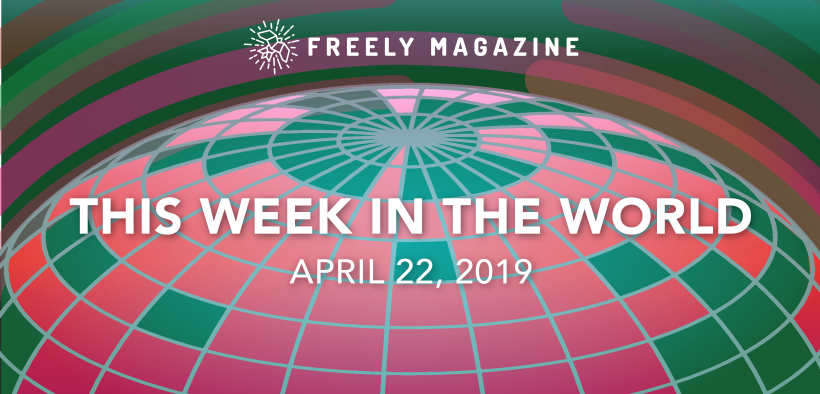This Week in the World | 4.22.19

Illustration credit: Peter Naktin
Ukraine
By Alice Hakvaag
Volodymyr Zelensky, most well known for being a Ukrainian comedian who portrayed incumbent president Petro Poroshenko, has just won Ukraine’s presidential election. Zelensky won 73% of the vote as of Sunday evening. The result is mainly viewed as an embarrassment to the current establishment, since Zelensky has no prior political experience. At a celebration on Sunday, Zelensky said to supporters, “I will never let you down… Look at us. Anything is possible!”

Photo: REUTERS/Valentyn Ogirenko
Sri Lanka
By Alice Hakvaag
Over 200 people were killed on Easter Sunday after eight blasts occurred, targeting churches and large hotels. It is still not known who is behind the attacks, but a dozen people have been arrested in connection to the blasts. The government since then has shut down some social media outlets in an attempt to cut down on false information, and has instituted a curfew. Condolences have been sent from across the world, with world leaders from the United States, New Zealand, and the UN making statements. Among those killed were 15 foreigners, ranging from British and Danish citizens to Turkish and Indian citizens.

Photo: Chamila Karunarathne/AP
Morocco
By Alice Hakvaag
Protesters have gathered in the Moroccan capital of Rabat, demonstrating against the imprisonment of activists. The activists were largely a part of Hirak Rif, or “Rif Movement,” and lobbied against unemployment and corruption. They had been arrested for organizing previous demonstrations in 2016 and 2017. The current protest comes after a court upheld the sentences of three of the major figures in the movement, who have been sentenced to 20 years each, and was organized by family members of those imprisoned and local civil rights groups. Authorities have said they were “threatening the security of the country.”

Photo: REUTERS/Youssef Boudlal
South Africa
By Hal Conte
A government panel has backed the expropriation of land without compensation from large-scale farm owners, a policy supported by the South Africa’s ruling party, the African National Congress. The measure is designed to reduce rural poverty and cool off anger amid large-scale protests by farmers. Both some proponents and critics of the idea of land reform see it as a form of justice for the black majority after years of confiscations by the white minority during the Apartheid era. While international businesses’ main concerns is that the popular plan could undermine property rights, white supremacists internationally have pumped up the issue as so-called “reverse racism,” and have pointed to fake news on wide-scale murders of white farmers.
Argentina
By Hal Conte
Inflation and cuts to social services under an I.M.F. bailout in Argentina have soured so many citizens on the economic state of the country that they are currently likely to toss out their conservative president, Mauricio Macri, after just one term in office. With the economic crisis being dubbed the “Macrisis,” it is possible that unions and left-wing movements will restore Cristina Fernandez, the populist predecessor of Macri, to power. While Fernandez left office with a high approval rating, she has since been charged with various crimes and could be indicted if she were not an elected official. Foreign investors are also concerned that she might default on part of the country’s debt, although during her previous term the country’s economy was in better shape than it is now.

Photo: Mario De Fina/NurPhoto via Getty Images
Greece
By Hal Conte
Germany could be paying Greece $300 billion in reparations for the actions of the Nazis during the World War II-era occupation as a result of a resolution passed by Greek lawmakers last week. If they refuse, the Greek government could consider confiscating German property. In the 1960s, the West German government paid money to Greece as an apology for the Nazi occupation, and today’s German government says that the issues was “conclusively settled,” according to a spokesperson. They also said that Germany was aware of the crimes it had committed during the Nazi regime. Although Greece’s main opposition New Democracy party and others also backed the current push for repayment, critics say that the request is payback for a 10-year German-backed austerity plan wildly unpopular in Greece.

Photo: REUTERS/Costas Baltas



